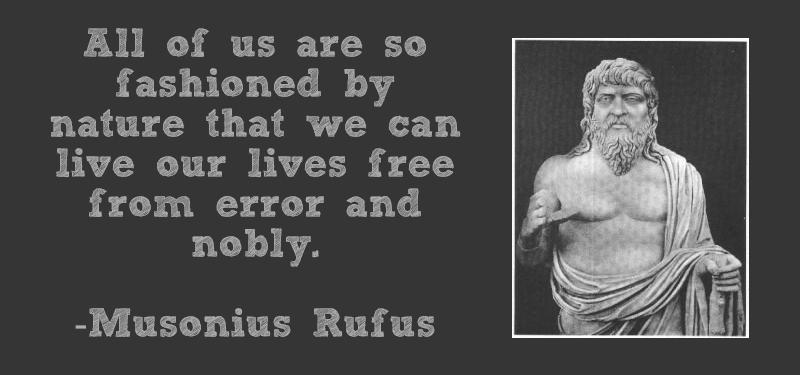According to the Roman Stoic philosopher Musonius Rufus, humans are innately virtuous, but our nature is degraded from childhood by negative socialization. The dominant political and social environment is corrupting to the soul. Bad habits, unconsidered social norms, and negative views of "reality," that we pick up as we go through life, often impede our personal development.
By the time we reach adulthood, we all have accumulated beliefs that our culture imposes on us, including our views on money, pleasure, leisure, and entertainment. We may view minor inconveniences as a hardship, and fear things that are beyond our control. Even if our parents don't model this behavior, peers, the media, and the the culture at large often do. Living in society handicaps us in this regard.
Fortunately, developing a philosophical outlook can correct the effects of negative socialization. Musonius argued that “All of us are so fashioned by nature that we can live our lives free from error and nobly.” [1]
Is Human Nature Naturally Bad?
Why then pray, when one who has not learned letters or music or gymnastics never claims to have knowledge of these arts nor makes any pretense of knowing them, and is quite unable even to name a teacher to whom he went, why, I say, does everyone profess that he has virtue? It is because none of those other skills is natural to man, and no human being is born with a natural faculty [for them, whereas an inclination toward virtue is inborn in each one of us.]”[2]
Agents of Negative Socialization
According to Chris Fisher over at the great website, Traditional Stoicism:
Modern advertising specialists manipulate our innate human desires when they bombard us with images and value judgments (impressions) designed to arouse our natural impulses to levels far in excess of what is necessary for well-being. These advertisements often redefine human prosperity solely in terms of material acquisition, sex appeal, social status and power. The Stoics sought to understand human nature and constrain human desires within reasonable boundaries, so they do not become self-destructive. This resulted in the Stoic motto, “live according to Nature.”
Faulty Judgments About Reality, and Their Antidotes
Faulty Belief 2. That money is a good in and of itself. We live in a very decadent, consumerist society. Musonius Rufus advocated that we use to money to help others through generosity. You can retrain your mind to let go of unreasonable attachment to money and consumerism by donating to charity, deliberately forgoing something that you want, or buying a less expensive version of something that you really need.
Musonius' student, Epictetus, said, “Wealth consists not in having great possessions, but in having few wants.”
Faulty Belief 3. Hardship should be avoided. Sometimes problems or annoyances allow us to grow. The Stoics believed that a life of luxury makes a person an invalid. Engaging in physical labor or exercise strengthens the body. You can also change how you view minor annoyances and daily occurrences, practicing patience, rather than letting things get to you.
Faulty Belief 4. That we should fear of death, war, and things in the news. These are all events that we have little to no personal control over. These are what the Stoics called "external indifferents." Rather that focus on or fear external indifferents, we should focus on what we can control; our actions and our character.
A recent book by psychologist Dr. Jean Twenge, confirms that the modern focus on what the Stoics considered external indifferents, is in fact bad for mental health.
“There’s clear evidence that the focus on money, fame, and image has gone up… and there’s also clear evidence that people who focus on money, fame, and image are more likely to be depressed and anxious,” Twenge states.
Change Your Perspective, Change Your Life
By reconsidering what we give our attention to, we can retrain our minds and reform our habits. Musonius Rufus believed this was possible trough philosophy:
Since, then, I repeat, all this is the case, the person who is in training must strive to habituate himself not to love pleasure, not to avoid hardship, not to be infatuated with living, not to fear death, and in the case of goods or money not to place receiving above giving. [3]
We should focus on what is directly in our control and trust the rest to a benevolent cosmos. The World is yours to see however you want to see it.
[1] Richard Valantasis. Musonius Rufus and Roman Ascetical Theory (2001). grbs.library.duke.edu/article/download/2201/5953
[2] Lutz. Musonius Rufus Stoic Fragments.
[3] Valantasis.
[4] ibid.
You May Also Like The Following Posts:
The Secret to Happiness: Stoic Gratitude and the Art of Living
Are Covert Manipulation Techniques Ethical?
The Shadow: How Introspection Can Teach You Everything You Need to Know About Yourself










